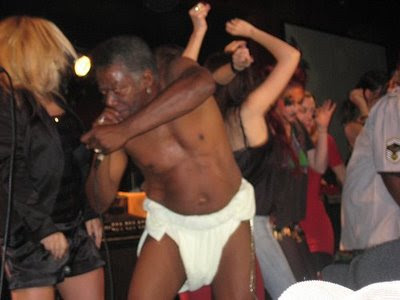Not the usual topic of choice for my blogsite, but the sport of boxing has always fascinated me. Violent and barbaric, yes. But no other sport combines science and art quite like boxing. Don't believe me? Well, see one of its finest examples for yourself:
"
Rumble in the Jungle," the now infamous 1974 bout in Zaire (now Democratic Republic of the Congo) between then undefeated Heavyweight champion George Foreman (40-0)* and the challenger, the great Muhammad Ali (44-2)*. (*Professional boxing record at time of the fight.)
Ali is 7 years older than Foreman and many thought that he, the greatest fighter in this professional sport, was no match for the young Foreman, who in the previous year knocked down Joe Frazier and forced
Howard Cosell to yell those infamous words: "Down Goes Frazier! Down Goes Frazier! Down Goes Frazier!"
In that fight, Ali invented the "rope-a-dope" style, which simply put allowed Ali to take Foreman's hard-hitting punches while lying on the ropes. This tired Foreman out and Ali, also seemingly tired, caught a second wind, hitting Foreman with huge haymakers and body blows. And then that wonderful "one-two" combination and "Down goes Foreman!!!" The young Foreman was just defeated by an "older" Muhammad Ali. Perhaps his classic mantra was actually true: "HE floated like a butterfly and HE 'stung' like a bee." It was a brilliant phenomenon that perhaps only the gods themselves can explain.
This fight occurred nearly 40 years ago--before I was born. But this classic bout came to mind after watching yesterday's Welterweight bout,
Mayweather vs. Mosley, on HBO PPV. What a waste of $55.
First, let's point out the comparisons between "Mosley & Mayweather" and "Ali & Foreman": In both fights, the difference in age between the opponents was roughly 6-7 years. Both Ali and "Sugar" Shane Mosley were considered the underdogs in their match-ups. In the height of his career, Foreman was viewed as a "patriotic Uncle Tom" for he never took the political stance that Muhammad Ali has outside of the ring. Floyd Mayweater, Jr. puts on a minstrel show in every episode of "24/7" that he appears on: dancing around, highlighting his enormous wealth (although he did FINALLY touch on his tax problems in recent episodes of "24/7") and worst of all, teaching his children those same materialistic, shallow views on life.
Just like Muhammad Ali in 1974, "Sugar" Shane Mosley was supposed to show America a depiction of a black man rarely seen today--especially in boxing. One that has dignity, one that stands for honor, one who doesn't have to rely on the pomp and frills of materialism the way that Mayweather does (and perhaps even Foreman--although I did own the "Foreman grill" at one point during graduate school). Like Ali, Mosley should have stood victorious, to show boxing fans that you can win without necessarily having flash and $$ power like Mayweather.
Unfortunately, that lesson did not come across. In Round Two, Mosley made the cocky Mayweather buckle just a bit after hitting him with hard hooks and body shots, which could have knocked him (and his enormous ego) out for good. However, he perhaps used too much momentum in the earlier rounds and just wasn't able to find his rhythm again. Mayweather, the little lecherous snake that he is, preyed on Mosley's momentary weakness and in short, won the fight. I never watched Round 12, the fight's final round. I prayed, which I never do, for a miraculous hard-hitting knockout to come from Mosley, but his punches just didn't have any steam left in them. My prayers were never answered.
Although Mosley was not victorious in this fight, he will join the company of greats like Ali, Joe Louis and now, he will now become the third "Sugar" in boxing history, along with Ray Robinson and Ray Leonard.
Floyd Mayweater, Jr., on the other hand, repeatedly says that he does not fight for legacy, but he fights for a paycheck. What his youthful ignorance fails to realize is that his blatant materialism and his self-proclamations of his greatness (that he's better than Ali, Joe Louis, etc.) are all a part of the mark that he wants to leave in the sport. If that's not a "new millennium minstrel show," then what is it?





